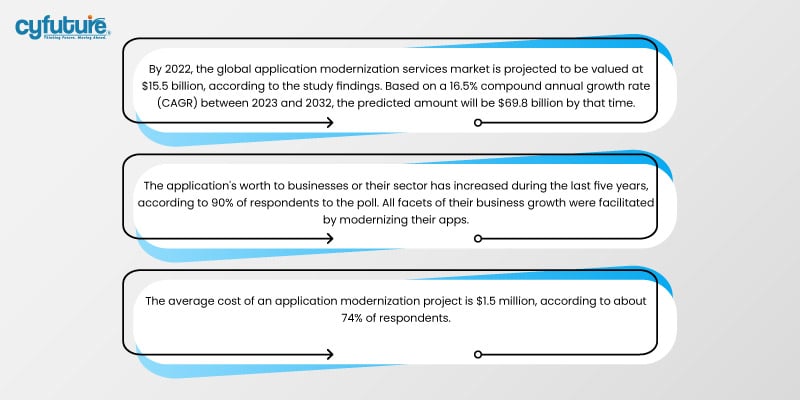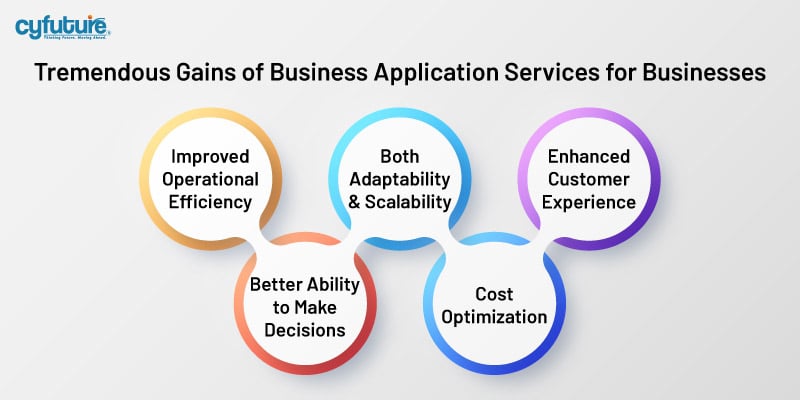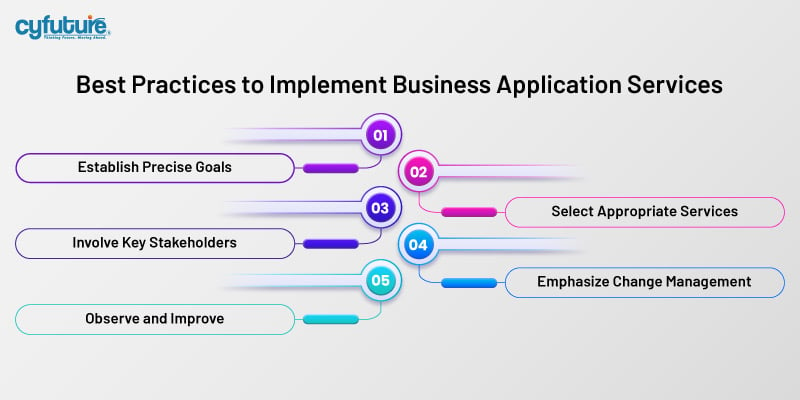-
Get Cloud GPU Server - Register Now!
Toggle navigation

Do you want to see the hidden potential of your company? Have you ever wondered about how Business Application Services may revolutionize a business?
Well, a recent survey of business leaders revealed that 87% of them think modernization is essential to the expansion and profitability of their companies.
Staying competitive in today’s rapidly evolving company landscape requires more than just offering top-notch goods or services; it also means utilizing technology to optimize operations, enhance client satisfaction, and spur expansion.
Furthermore, companies in all industries understand how important it is to leverage the potential of business application services to unlock hidden capabilities and gain a competitive edge.
For businesses to thrive in the digital era, making the shift from antiquated methods to innovative digital solutions has become essential. Besides, businesses have to keep up with the rapid advancement of technology by embracing new tools and approaches to be profitable and relevant.
A vast array of software solutions that support businesses in streamlining processes, increasing productivity, and accomplishing their goals are included in business application services. However, these services provide several advantages that have the power to completely change how businesses operate, from enterprise resource planning (ERP) software to customer relationship management (CRM) solutions.
We’ll examine the transformative potential of business application services in this post, with a focus on how these resources may open doors, encourage creativity, and advance your organization.
However, let’s take a look into a few stats and data before delving deep.

Now, let’s investigate the latent potential within your organization that is just waiting to be unlocked.
A collection of software programs called Business Application Services (BAS) are designed to help and enhance various company activities and procedures. Programs that satisfy various operational needs, such as data analysis, customer interface enhancement, process efficiency, and resource management, are included in these services. The purpose of BAS is to provide businesses with the means by which they may operate more efficiently, make wiser choices, and accomplish their strategic objectives. Businesses may use these applications to ensure data integrity, automate repetitive tasks, and get competitive and growth-promoting insights.
A range of software categories, each suited to a particular business purpose, are included in Business Application Services:
ERP systems integrate key business operations into a single system, encompassing finance, HR, production, supply chain, services, and procurement. Through this connection, communication with external stakeholders is maintained and information flow among the company’s departments is improved.
CRM programs keep track of a business’s interactions with both current and potential clients. To build stronger business relationships, they use data analysis to look into vast amounts of information, including historical contacts between customers and the company. They put a lot of focus on customer retention and eventually sales growth.
By using BI technology, businesses may gather, handle, and evaluate vast volumes of data to get insightful information. These technologies provide organizations with the ability to find trends, enhance processes, and make data-driven decisions.
SCM systems help businesses manage the movement of goods, information, and money related to a product or service, from the procurement of raw materials to the ultimate delivery of the product to the consumer.
Payroll, performance reviews, hiring, employee data, and other HR duties are all managed with the use of HRM systems.

Business Application Services (BAS), which eliminate duplication and automate repetitive tasks, streamline processes and workflows. Employee concentration may now be directed toward more strategic duties rather than being bogged down by administrative work, which leads to a significant increase in productivity.
To facilitate seamless data flow and save time spent on manual data entry and reconciliation, enterprise resource planning (ERP) systems, for instance, integrate several corporate operations, including supply chain management, finance, and human resources, onto a single platform. Hence, companies get increased operational agility and quicker turnaround times.
Businesses may gain real-time insights into their performance because of BAS’s robust data analytics and reporting capabilities. Businesses may make more informed decisions that increase their competitiveness by using these data-driven insights.
For example, business intelligence (BI) systems aggregate data from several sources to offer comprehensive analysis and visualization. Leaders may make more definite and accurate strategic decisions by using this to help them spot patterns, pinpoint inefficiencies, and project future outcomes.
The ability of Business Application Services to adjust to shifting company needs is one of its most prominent benefits. Businesses may expand into new markets or launch new products and services with ease because of BAS’s ability to scale operations as they grow or change.
Specialized scalability offered by cloud-based solutions enables businesses to increase or decrease their IT resources in response to demand without having to pay hefty upfront fees. Businesses benefit from this flexibility by being able to adapt to changing market conditions.
Significant cost savings are achieved by using Business Application Services to enhance resource utilization. Automation of routine tasks and increased productivity may help businesses reduce costs and minimize waste.
In addition, the implementation of centralized resource management reduces total IT infrastructure costs by doing away with the necessity for separate system maintenance. Organizations can employ resources more wisely, increasing return on investment (ROI).
Employing BAS allows companies to serve their customers by personalizing interactions better. Systems for managing customer relationships, such as CRM, enable companies to build comprehensive client profiles, monitor interactions, and assess preferences.
Proactive customer support, targeted marketing campaigns, and a more tailored shopping experience are made possible by this. By fostering long-lasting relationships and encouraging repeat business, businesses may boost customer satisfaction and loyalty, which will ultimately lead to higher profits and faster business expansion.
Let’s take a closer look at some of the individual services and their effects to better understand how Business Application Services might help your company realize its full potential.
All businesses have different requirements, and universal solutions are frequently insufficient. Businesses may design solutions specifically suited to their own needs and objectives with the help of custom application development. Businesses may generate new income streams, improve client experiences, and increase operational efficiency by creating bespoke apps.
To provide real-time insights into stock levels and sales patterns, a retail company may, for example, create a custom inventory management system that interfaces with its sales platform. Guaranteeing that in-demand commodities are constantly available, may assist in managing inventory levels, lower expenses, and boost customer satisfaction.
Numerous businesses still employ antiquated and ineffective legacy systems. Adapting antiquated systems to utilize cutting-edge tools and methods is called application modernization. Facilitating seamless interaction with contemporary systems and apps is a bonus since it enhances security and performance.
A corporation may be greatly impacted by modernizing its software. To ensure customers have a seamless online banking experience, a financial institution can, for instance, modernize its core banking system. Expanding market share, bringing in new clients, and increasing consumer involvement might all result from this.
A vast array of software is used by businesses in today’s networked environment to manage many aspects of their operations. Unfortunately, there are often data inconsistencies and inefficiencies as a result of various apps operating in isolation. The process of integrating disparate systems to allow for seamless data transfer and communication is known as application integration.
Integrating applications may provide businesses with a more comprehensive view of their operations, which can lead to more effective and efficient decision-making. Sales employees may be able to better serve customers if they have real-time access to inventory levels and order statuses through the integration of an ERP and CRM system, for instance.
Any business may benefit greatly from data, but thorough analysis is necessary to fully realize its potential. Business Application Services is made up of business intelligence and sophisticated data analytics tools that help organizations make sense of their data. These tools have the power to uncover hidden trends, patterns, and insights that may inform and guide strategic choices.
To identify bottlenecks in their production process, for instance, a manufacturing company may use data analytics. Resolving these issues can increase output, reduce expenses, and improve efficiency. Additionally, managers may monitor performance and make informed decisions with the use of real-time dashboards and reports that business intelligence systems may offer.
The emergence of cloud computing has changed how businesses operate. Cloud services provide solutions for data management and application hosting that are scalable, flexible, and affordable. By using cloud services, businesses may reduce IT infrastructure costs, increase accessibility, and cooperate more successfully.
To collaborate with clients and team members across different locations, a marketing business might make use of cloud-based project management software. This may improve communication, simplify processes, and ensure that projects are completed on time.

Deployment best practices must be followed if you want to fully utilize BAS for your organization. The following are a few key points to remember:
It’s crucial to have clear objectives before using Business Application Services. Which goals are you trying to achieve? Setting clear goals will help guide your implementation strategy and ensure that you get the desired outcomes, whether your goal is to boost productivity, enhance the customer experience, or promote creativity.
Selecting the right Business Application Services for your company’s requirements is essential, as not all of them are created equal. Take into account the systems’ interoperability, scalability, and adaptability. Find the best fit for your business by doing a thorough analysis and collaborating with reputable service suppliers.
End users, IT teams, and CEOs are among the important stakeholders who must support the implementation of BAS. To make sure that their needs and concerns are addressed, involve these stakeholders as early in the process as possible. This will facilitate the integration and uptake of the new services.
Significant changes to current practices and procedures are often required when implementing Business Application Services. Making sure the move goes well requires effective change management. Address any resistance to change, train and support workers, and highlight the benefits of the new services.
Following implementation, BAS performance must be continuously monitored, and necessary modifications must be made. Observe key performance metrics and identify areas for development by using data analytics. To make sure you are maximizing the advantages of Business Application Services, regularly examine your goals and make any necessary adjustments to your plan.
For businesses hoping to reach their maximum potential and establish sustainable success, Business Application Services (BAS) provides a game-changing chance. In today’s competitive economy, deploying BAS is not only advantageous but also essential, as evidenced by a recent study where 87% of business leaders stressed the need for modernization for development and profitability.
Utilizing technology to streamline processes, boost customer satisfaction, and spur innovation is essential for firms to remain competitive. Data-driven decision-making, productivity gains, and operational optimization are all made possible by BAS’s comprehensive suite of software solutions, which includes ERP, CRM, BI, and SCM. Modernizing apps, integrating disparate systems, and utilizing cloud services may help businesses realize new opportunities, cut expenses, and boost scalability and flexibility.
Think about the ways that BAS has helped industry titans like Uber, General Electric, and Starbucks restructure and expand their companies tremendously. These actual cases show how much BAS may change business practices and uncover untapped opportunities.
Are you ready to discover the unrealized potential of your business? With the help of Business Application Services, start your journey immediately! Using specialized BAS solutions in your operations may help you boost output, enhance customer satisfaction, and experience long-term growth. Get in touch with us right now to find out more about how BAS may be customized to meet the needs of your unique business and set you up for success.
Indeed, BAS is suitable for businesses of all sizes. Scalable solutions tailored to the needs and financial constraints of small and medium-sized businesses are offered by several BAS vendors. These services provide access to cutting-edge tools and technology, enabling smaller enterprises to compete with larger organizations.
The price of implementing BAS varies depending on the specific services you need, the size of your business, and the complexity of your needs. Although adaptation and integration may incur early costs, BAS may lead to significant long-term cost savings through increased productivity and reduced operational costs.
Throughout BAS implementation, frequent obstacles include data transfer worries, user engagement assurance, integration difficulty, and resistance to change. To mitigate these concerns and ensure a smooth transition, successful change management, unambiguous communication, and comprehensive training may all be helpful.
The effectiveness of BAS installation may be evaluated using key performance indicators (KPIs) such as increased productivity, reduced costs, enhanced customer satisfaction, and enhanced ability to make decisions. To ascertain the impact and pinpoint areas for future growth, it might be helpful to routinely analyze these statistics and ask users for feedback.